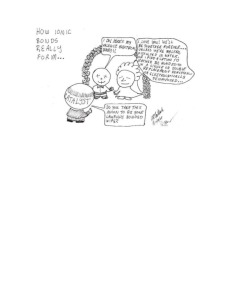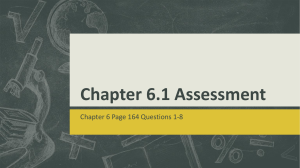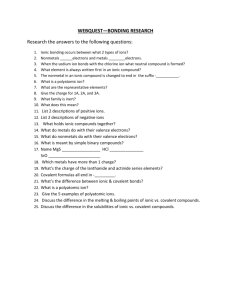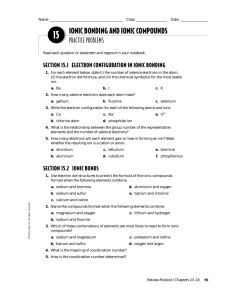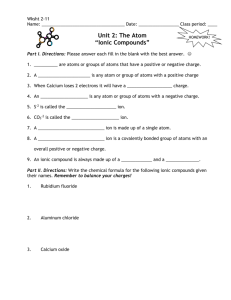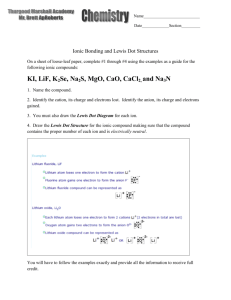Ionic Compounds & Molecules
advertisement
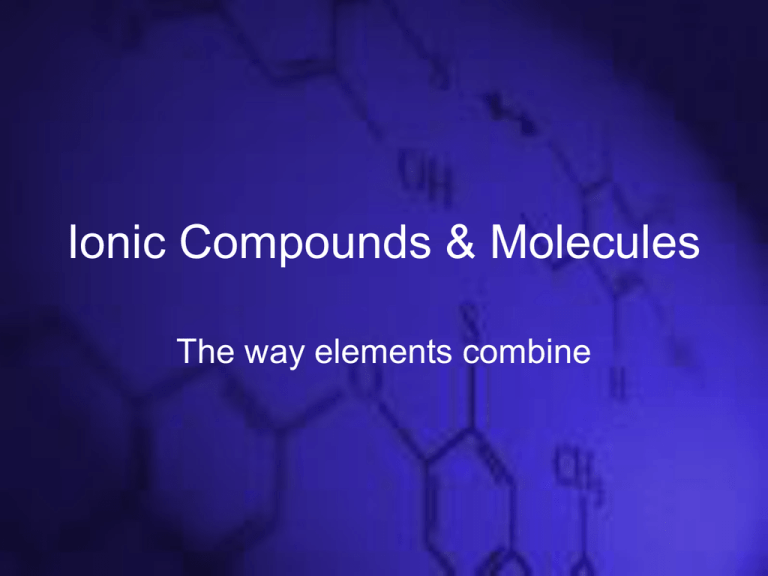
Ionic Compounds & Molecules The way elements combine Elements Compounds • When you add more than one element together, you get a compound. • Compounds are pure. • They are broken apart again in chemical reactions. • What are some compounds you are already familiar with? – H2O – NaCl - CO2 - C6H12O6 - H2O2 Ions • An ion is an atom or a group of atoms that has an electric charge. • They have the charge because they either lost or gained an electron(s). Ions • If an atom loses an electron, it has a positive charge. • For example: Li+, Na+, K+, NH4+, Ca2+ • If an atom gains an electron, it has a negative charge. • For example: F-, Cl-, I-, HCO3-, NO3-, O2- • Notice, sometimes the numbers are below (subscript) and sometimes they are above (superscript). This means different things. Ionic Bonds • An ionic bond is the attraction between two oppositely charged ions. • When you add a positive ion to a negative ion you usually get a ionic compound. • The compound’s charges cancel and make it neutral. Ionic Compounds • When two oppositely charged ions attract, you get an ionic compound. • (Write the electron dot diagrams for Na, Mg, and Cl) • Some examples are: .. - = NaCl [Na]+ + [:Cl:] .. .. .. - + [Mg]2+ + [:Cl:] - = MgCl [:Cl:] 2 .. .. Naming Ions • The name of the positive ion comes first, followed by the negative ions. • If the negative ion is a single element, the name ends in –ide. • If the negative ion is polyatomic (more than one atom), the name ends in –ate or – ite. • Example: NaCl- Sodium Chloride MgO – Magnesium Oxide K2SO4 – Potassium Sulfate Properties of Ionic Compounds • In general, Ionic compounds are: – Combination of metal + non metal – Many are solid at room temperature – Hard, brittle crystals – High melting points and boiling points – If dissolved in water they conduct electricity due to strong charges Covalent Bonds • Covalent bonds are a different type of bond than ionic bonds. • When atoms share their electrons rather than gain or lose them, you get a covalent bond. • The force holding the atoms together is the attraction of each atom’s nucleus for the shared electrons. Molecules • A molecule is a compound composed of atoms that are sharing electrons in a covalent bond. • (Write the electron dot diagrams for O, C, and N) • Some examples are: .. .. .. .. . . . .O .+ .O .= O O = . .. . .. . .. .. O2 O + C + O = O C O = CO2 N + N = N N = N2 Some Funny Molecules More Funny Molecules Polar Molecules • Sometimes the nucleus of one atom pulls more strongly on the electrons than the nucleus of the atom it is sharing with. This unequal sharing of electrons is called a polar bond. • As a result, the electrons are pulled slightly closer to one atom than the other which causes the molecule to have slight electrical charges. What Polar Molecules? • One of the most common polar molecules is water. • The strong polarity of water is what makes it “stick” together seemingly Polar Water Naming Molecules • Naming of molecules is different from naming ionic compounds. • Often times Latin prefixes are used. • One = mono Two= di • Three = tri Four = tetra • Five = penta Six = hexa • Seven = hepta Eight = octa • Nine = nona Ten = deca Naming Molecules • Compound Systematic name • • • • • • • • • • • • • NF3 NO NO2 N2O N2O4 PCl5 SF6 S2F10 H2O H2S NH3 N2H4 PH3 nitrogen trifluoride nitrogen monoxide nitric oxide nitrogen dioxide dinitrogen monoxide laughing gas dinitrogen tetraoxide phosphorous pentachloride sulfur hexafluoride disulfur decafluoride dihydrogen monoxide water dihydrogen monosulfide hydrogen sulfide nitrogen trihydride ammonia dinitrogen tetrahydride hydrazine phosphorous trihydride phosphine Common name Some Irregular Molecules • Irregular names are often that way because they were named prior to the system being in place and the names stuck. • CH4 • C6H6 • C2H6 • C2O2H4 • H2O Properties of Molecules • In general, molecules are usually: – The combination of a non-metal + non-metal – Many are liquid or gas at room temperature – Lower melting and boiling points than ionic compounds (because of less strong attraction for each other). – When dissolved in water, they do not conduct electricity. Ionic Bantering • I just lost an electron. Are you sure? Yes, I'm positive. • You need to keep and ion people who make jokes like that. • So true. I could be negative and moan about it, but he is a bright spark, with an electrifying whit. Not too sure if those in-charge feel the same. • OK, so I'm no comic. I should have stayed static and realised my potential in my own field. • Perhaps we should conduct ourselves away from the current discussion. • There may be some resistance to that suggestion. • This is all too shocking. • Are you serious? Because people who can be serious now and then tend to show increased potential. • If this surge of replies continues, i fear i may blow a fuse.
